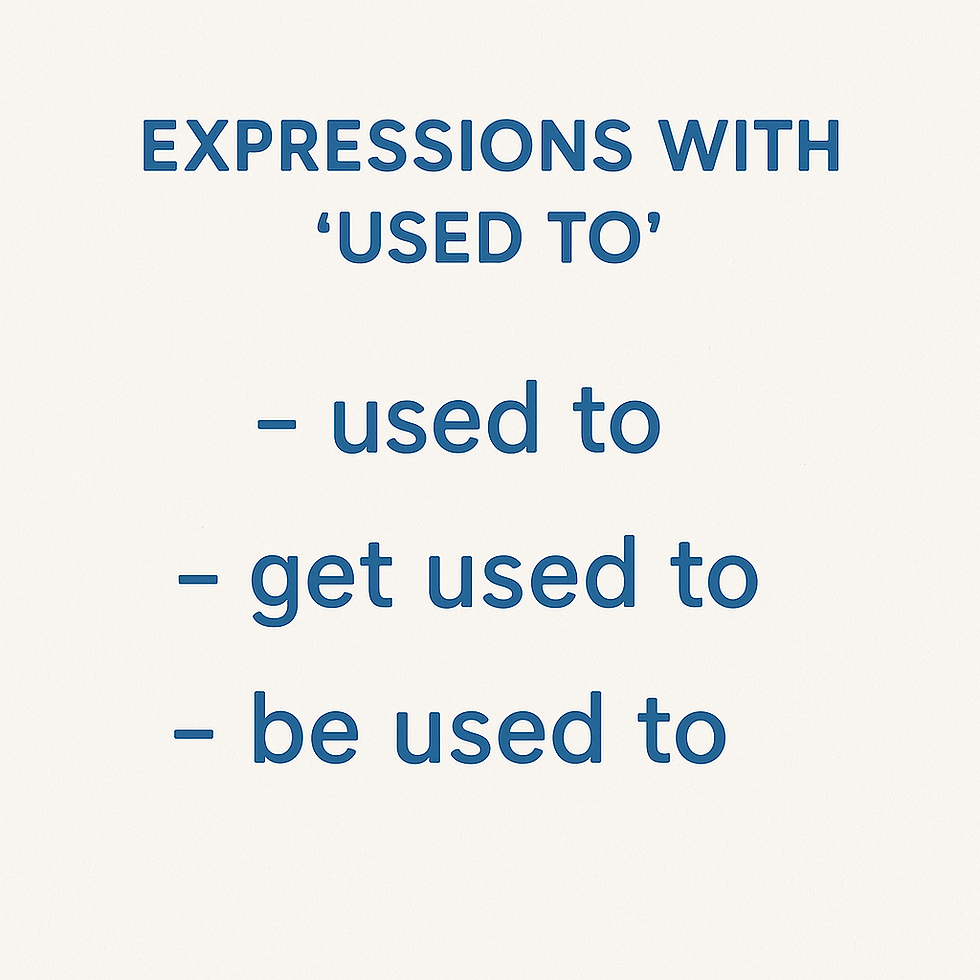Get Used to It : Maîtriser “Used to”, “To Get Used to” et “To Be Used to”
- James Batchelor

- 17 juil. 2025
- 2 min de lecture
Dernière mise à jour : 22 juil. 2025

Soyons honnêtes : ces trois expressions posent souvent problème.Si vous avez déjà dit “I am used to go to the gym” ou “I used to waking up early”, rassurez-vous — c’est très courant.
Mais la bonne nouvelle, c’est que tout devient plus clair quand on comprend les différences entre habitude passée, adaptation, et confort actuel.
“Used to” = Une habitude passée
Structure: Sujet + used to + verbe à l’infinitif
Utilisez cette structure pour parler d’une habitude ou d’un état dans le passé, qui n’est plus vrai aujourd’hui.
Exemples :
I used to live in New York.
She used to eat meat.
À retenir : une action ou situation du passé qui n’existe plus.

“To Get Used To” = S’habituer à quelque chose
Structure: Sujet + get used to + nom ou verbe en -ing
Utilisez-la pour parler d’un processus d’adaptation — on apprend à gérer quelque chose de nouveau.
Exemples :
I got used to driving on the left.
He’s getting used to his new job.
À retenir : adaptation ou changement en cours.
“To Be Used To” = Être habitué à quelque chose
Structure: Sujet + be used to + nom ou verbe en -ing
Utilisez-la pour dire que quelque chose vous semble désormais normal.
Exemples :
I’m used to waking up early.
She’s used to the cold weather.
À retenir : on est déjà à l’aise avec cette chose ou situation.
Comparaison
Expression | Signification | Exemple |
Used to | Habitude dans le passé | I used to smoke. |
To get used to | Être en train de s’adapter | I’m getting used to Paris. |
To be used to | Être déjà à l’aise | I’m used to city life. |
Practice Activity
Complétez avec : used to / be used to / get used to
When I first moved to Paris, I had to __________ the metro system.
I __________ live in a small town before moving to the city.
Now I __________ taking the metro every day.
He never __________ eat spicy food, but now he eats it all the time.
I’m __________ working late hours — it’s part of the job.
She is __________ driving on the right side of the road after moving back to Europe.
They __________ go to the gym every morning when they lived in Madrid.
We are slowly __________ the new software.
Are you __________ speaking in front of large groups?
My parents __________ write letters by hand.
Answer Key
get used to
used to
am used to
used to
am used to
getting used to
used to
getting used to
used to
used to
Conclusion
Ces expressions peuvent sembler difficiles, mais en comprenant si l’on parle du passé, d’un changement ou d’une situation normale, vous les utiliserez avec plus de confiance.
Envie de vous entraîner en situation réelle ?
Rejoignez ma formation CPF d’anglais à Vincennes, suivez mes cours particuliers d’anglais, ou progressez à votre rythme avec mon programme d’E-learning — tous conçus et animés par moi, professeur d’anglais à Vincennes.

Commentaires